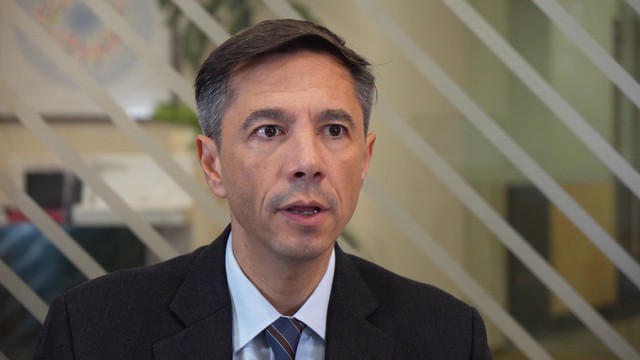WB Lead Country Economist: Viet Nam has strong macro-economic performance in 2022
VGP - Viet Nam has a strong macroeconomic performance in 2022. The economy grew by 8.02 percent in 2022. This is a remarkable result, particularly considering the economic slowdown experienced in the rest of the world.

World Bank (WB) Lead Country Economist and Program Leader for Equitable Growth, Finance and Institutions in Viet Nam Andrea Coppola - Photo: VGP/Quang Thuong
In a recent interview with the VGP, World Bank (WB) Lead Country Economist and Program Leader for Equitable Growth, Finance and Institutions in Viet Nam Andrea Coppola, Viet Nam's strong economic performance in 2022 has been driven by four main factors.
The first factor is the country's export drive, which has been very strong in the past and has shown to be resilient, including during the COVID-19 crisis when manufacturing exports were the main driver of GDP growth.
Even though the growth of exports is forecasted to slow down as global demand is weakening, exports will continue to contribute to growth going forward.
The second driver of growth was domestic demand. Domestic consumption and retail sales were powerful engines of growth for the country in the past year. This is reflected by the strong recovery of retail sales, which grew by 17 percent year-on-year in October 2022 compared to 0.4 percent year-on-year in January. Domestic demand is expected to be affected by rising domestic inflation going forward but continue to contribute positively to growth in 2023.
Third, it is clear that private investments played an important role. During the first 11 months of 2022, FDI disbursements grew by more than 15 percent than during the same period in 2021.
Finally, the COVID-19 pandemic had a strong impact in Viet Nam in 2021, particularly during the third quarter of the year. As a result, the strong economic performance in 2022 is also the result of a low-base effect.
Challenges for Viet Nam's economy in 2023
However, 2023 is going to be a much more difficult year and the economy is predicted to slow down during the next months, as the global economic outlook is gloomy and this is going to affect Viet Nam's economic performance.
In the current global context characterized by uncertainty and risks, Viet Nam's policymakers have the difficult task of balancing the need to provide continued policy support to solidify the recovery with the need to contain emerging inflation and financial risks.
High uncertainty will require the policy mix to be adapted to changing circumstances. If U.S. Federal Reserve (FED) continues raising interest rates and exchange rate pressures persist, Vietnamese monetary authorities could consider allowing further flexibility in the exchange rate, including through a quicker pace of devaluation of the reference rate.
Given the persistence of exchange rate pressures, direct foreign exchange sales could be used very cautiously to preserve international reserves.
However, policy room is limited as interest rates are already high. Close coordination between monetary and fiscal policy would help to minimize further increases of the interest rates.
Authorities could consider reining in public expenditure while prioritizing expenditures on human capital development and accelerating the implementation of selected public investments with the highest expected impact on economic growth. Effective public investment management is critical to promote economic growth in an inflationary context.
To strengthen public investment management efficiency, the authorities could strengthen project quality-at-entry for example by promoting a better estimation of costs and benefits, including land settlement cost.
As for financial sector policies, to address liquidity challenges in the banking sector, in case some banks become more vulnerable and require support, the State Bank of Viet Nam (SBV) could help to restore confidence by providing emergency liquidity assistance provided that banks have a plan in place to restore a satisfactory liquidity position, without continuous reliance on SBV lending.
In the medium term, Viet Nam's bank resolution framework could be enhanced to further enhance financial stability and a consolidated supervision framework could be strengthened to effectively monitor and assess systemic risks across markets, including banking, capital markets and higher-risk sectors such as real estate.
WB Lead Country Economist Andrea Coppola talks about four main factors that leads Viet Nam's strong economic performance in 2022
Heading to become high-income economy by 2045
Regarding the role of the institution in Viet Nam's aspiration to become a high-income economy by 2045, Andrea Coppola said that modernizing existing institutions is a key priority of the socio-economic development strategy adopted by the Party Congress in February 2021.
A series of institutional reforms can help the country avoid the middle-income trap by increasing its capacity to respond to new and complex global and domestic challenges.
According to a recent World Bank Group systematic country diagnostic report titled "How will Viet Nam blossom", improving Viet Nam's performance requires five institutional reforms including creating a solid institutional anchor that will transform development priorities into concrete actions; and streamlining administrative processes to increase the effectiveness of government at all levels.
The other reforms consist of using market-based instruments to motivate public and private stakeholders; enforcing rules and regulations to enhance motivation, trust, and fairness; and engaging in participatory processes to secure greater transparency and accountability.
By adopting these institutional reforms more systematically, Viet Nam will underpin its vision for economic development, strengthen its capacity to implement national strategies, and boost its capacity to produce results in several key areas that will help the country achieve its development goals, such as green growth, digital transformation, financial inclusion, social protection, and infrastructure upgrading, he emphasized./.
